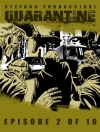Down below, like some gigantic monster from Earth’s dark past, a moving van waited in the mist. Judging the distance as best he could, Joe leaped into space . . .
Get Joe Hawkins! Vicious former skinhead Joe Hawkins has done a runner from prison. On the lam, he cuts a swathe through England’s heartland, sex and violence very much on his mind. Newly equipped with a shooter, Joe pals up with armed robbers, evading the coppers by a whisker. But Joe’s now a marked man – a powerful criminal is gunning for him, with no plans to quit until he’s found his target. Even Joe’s never been in this tight a spot before . . .
Skinhead Escapes (1972) was the third book in Richard Allen’s bestselling Skinhead series, one of the most potent artefacts of British popular culture ever committed to print.
“I did happen to read Skinhead when it came out and I was quite interested in the whole Richard Allen cult . . . suedeheads and skinheads and smoothies were very much part of daily life. There was a tremendous air of intensity . . . something interesting grabbed me about the whole thing.” Morrissey
“(Richard Allen’s) work shouldn’t require a theoretical summing up, once enough of those to whom it appeals understand its attraction we will have superceded this society.” Stewart Home
Mengenai Pengarang
Richard Allen was the pen-name of James Moffat, born in Canada in 1922.
Moffat was prolific, though one repeated claim that he was the author of ‘at least 290 novels in several genres under at least 45 pseudonyms’ still requires independent verification. It is known that Moffat contributed to an early draft of the novel Somewhere in The Night, which was later completed (or entirely rewritten – sources differ) by Michael Moorcock and published under the pseudonym Bill Barclay in 1966.
However it was Moffat’s gritty youthsploitation novels, published in the 1970’s and early 1980’s under the name Richard Allen, that form the bulk of his legacy today. The Joe Hawkins story began in Skinhead (1970) and was continued in Suedehead (1971). Later there were further instalments in Joe Hawkins’ story, as well as novels focussing on other youth movements such as Smoothies (1973), Punk Rock (1977) and the final Allen novel Mod Rule (1980). Altogether there were eighteen novels under the Richard Allen brand.
James Moffat spent most of his final decade in obscurity, though he lived to see the reissue of the Richard Allen novels in the early 1990’s. He died in July of 1993, while living in a nursing home in Newton Abbot.












